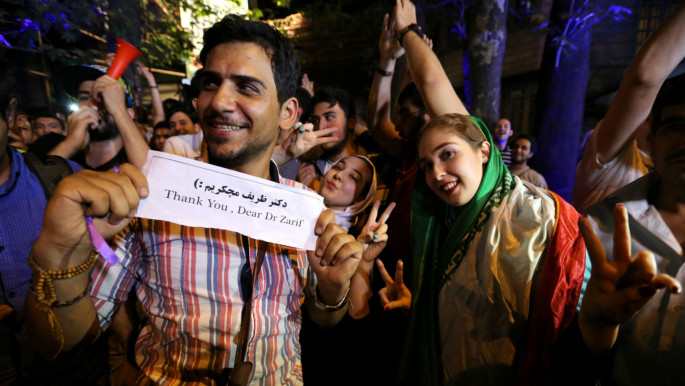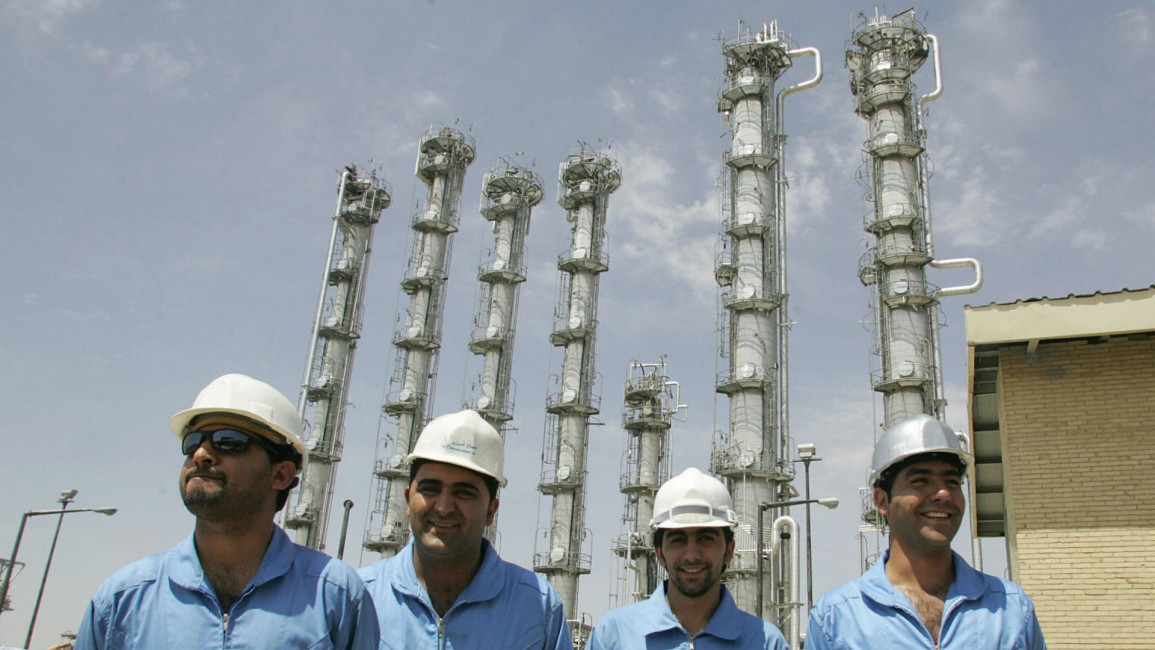Global nuclear watchdog ends decade-long Iran nuclear probe
Global nuclear watchdog ends decade-long Iran nuclear probe
The IAEA, has closed a 12-year investigation into the possible military dimensions of Iran's nuclear programme.
3 min read
Iran has pledged to slash the number of centrifuges that enrich uranium [Getty]
The UN atomic watchdog's board on Tuesday drew a line under a long-running probe into Iran's past efforts to develop nuclear weapons, removing an important obstacle to implementing July's landmark deal with global powers.
A resolution approved by the International Atomic Energy Agency's 35-nation board of governors in Vienna "closes the board's consideration of the matter" and clears the way to annul previous resolutions.
Iran's envoy to the IAEA said afterwards that Tehran would now "accelerate" enacting its side of July's deal, and would scale down its nuclear programme in exchange for sanctions relief, fulfilling its side of the bargain within "two to three weeks".
The IAEA keeps close tabs on Iran's nuclear programme, and its inspections role is set to grow under July's hard-fought deal, which defused a standoff dating back to 2002.
But the Vienna-based watchdog has also long sought to clear up allegations that until 2003, and possibly since, Iran also secretly sought to develop an actual nuclear weapon.
After stalling for many years, Iran agreed in July to cooperate with the IAEA to address the claims.
The IAEA on December 2 released a "final assessment" - even though it did not receive all the information it sought - concluding that some of the allegations were indeed accurate.
It said Iran conducted "a range of activities relevant to the development" of a nuclear bomb until 2009, although this work was preliminary and did not involve fissile material.
Continued scrutiny
Despite the findings, the six major powers - the US, Russia, China, Britain, France and Germany, who co-authored the IAEA resolution - decided to move on.
Despite Iran's "long history of concealment, denial and deception", the July deal is "forward-looking", the US ambassador to the IAEA, Henry Ensher, said on Tuesday.
Diplomats stress that Iran will remain under close IAEA scrutiny.
Nor is Iran completely out of the woods with the IAEA, with the agency's "broader conclusion" that all Iran's activities are exclusively peaceful still several years away.
"This is not the end of the process at all," IAEA head Yukiya Amano told reporters, saying that a "legacy of mistrust between Iran and the international community" remains to be overcome.
Implementation day
The IAEA will also have to confirm that Iran has enacted all its commitments under the July deal - on a day to be dubbed "Implementation Day" - which is expected in early 2016.
Under the deal Iran has pledged to slash the number of centrifuges - which can "enrich" uranium for peaceful uses but also for a bomb - from around 19,000 to 6,104, of which 5,060 will still operate.
Iran also has to change the design of a new nuclear reactor being built at Arak so that it produces substantially less plutonium, the alternative to uranium in a nuclear weapon.
Furthermore, Iran must reduce its stock of low-enriched uranium from several tonnes to just 300 kilos. Iran is expected to ship the material to Russia.
The last IAEA update on November 18 said that Iran had removed some 4,500 centrifuges. However, there was no progress at Arak or on the uranium stock.
"We are about to pack up the enriched uranium and send it out. It will take just two or three days," Iran's envoy to the IAEA, Reza Najafi, told reporters.
"We are planning to [remove the Arak reactor core] in two weeks, but we will see."
Amano said however that the IAEA would still need "some weeks" to verify and confirm that Iran has met its initial commitments.
A resolution approved by the International Atomic Energy Agency's 35-nation board of governors in Vienna "closes the board's consideration of the matter" and clears the way to annul previous resolutions.
 |
|
| File Photo: Iran will soon have its economic sanctions lifted [Getty] |
The IAEA keeps close tabs on Iran's nuclear programme, and its inspections role is set to grow under July's hard-fought deal, which defused a standoff dating back to 2002.
But the Vienna-based watchdog has also long sought to clear up allegations that until 2003, and possibly since, Iran also secretly sought to develop an actual nuclear weapon.
After stalling for many years, Iran agreed in July to cooperate with the IAEA to address the claims.
The IAEA on December 2 released a "final assessment" - even though it did not receive all the information it sought - concluding that some of the allegations were indeed accurate.
It said Iran conducted "a range of activities relevant to the development" of a nuclear bomb until 2009, although this work was preliminary and did not involve fissile material.
Continued scrutiny
Despite the findings, the six major powers - the US, Russia, China, Britain, France and Germany, who co-authored the IAEA resolution - decided to move on.
Despite Iran's "long history of concealment, denial and deception", the July deal is "forward-looking", the US ambassador to the IAEA, Henry Ensher, said on Tuesday.
Diplomats stress that Iran will remain under close IAEA scrutiny.
Nor is Iran completely out of the woods with the IAEA, with the agency's "broader conclusion" that all Iran's activities are exclusively peaceful still several years away.
"This is not the end of the process at all," IAEA head Yukiya Amano told reporters, saying that a "legacy of mistrust between Iran and the international community" remains to be overcome.
Implementation day
The IAEA will also have to confirm that Iran has enacted all its commitments under the July deal - on a day to be dubbed "Implementation Day" - which is expected in early 2016.
Under the deal Iran has pledged to slash the number of centrifuges - which can "enrich" uranium for peaceful uses but also for a bomb - from around 19,000 to 6,104, of which 5,060 will still operate.
Iran also has to change the design of a new nuclear reactor being built at Arak so that it produces substantially less plutonium, the alternative to uranium in a nuclear weapon.
Furthermore, Iran must reduce its stock of low-enriched uranium from several tonnes to just 300 kilos. Iran is expected to ship the material to Russia.
The last IAEA update on November 18 said that Iran had removed some 4,500 centrifuges. However, there was no progress at Arak or on the uranium stock.
"We are about to pack up the enriched uranium and send it out. It will take just two or three days," Iran's envoy to the IAEA, Reza Najafi, told reporters.
"We are planning to [remove the Arak reactor core] in two weeks, but we will see."
Amano said however that the IAEA would still need "some weeks" to verify and confirm that Iran has met its initial commitments.



